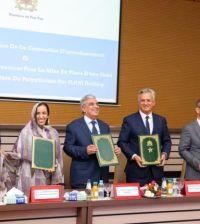- Washington “follows with interest” Morocco’s openness onto Africa (John Kerry)Posted 12 years ago
- The trial of South African Paralympic champion Oscar Pistorius opened in Pretoria on Monday.Posted 12 years ago
- USA welcomes efforts of King Mohammed VI in MaliPosted 12 years ago
- Egypt’s population reaches 94 millionPosted 12 years ago
- Mugabe celebrates his 90thPosted 12 years ago
- Moroccan Monarch to Build a Perinatal Clinic in BamakoPosted 12 years ago
- King Mohammed VI handed a donation of bovine semen for the benefit of Malian breeders.Posted 12 years ago
- Moroccan King’s strategic tour to Africa: Strengthening the will of pan African Solidarity and stimulating the south-south cooperation mechanisms over the continentPosted 13 years ago
- Senior al-Qaida leader killed in AlgeriaPosted 13 years ago
- Libya: The trial of former Prime Minister al-Baghdadi AliPosted 13 years ago
Japan’s Shimon Sakaguchi wins Nobel Prize for discovery of immune system ‘brakes’
R.ELM . Tokyo: In a quieter corner of Osaka, Professor Shimon Sakaguchi has spent four decades probing one of medicine’s great riddles: how the body learns not to attack itself. On Monday, the 74-year-old Japanese immunologist was thrust into the global spotlight as co-winner of the 2025 Nobel Prize in Physiology or Medicine, honoured for his discovery of regulatory T cells — the microscopic “brakes” that prevent the immune system from turning its fire inward.
The award, shared with American researchers Mary E. Brunkow and Fred Ramsdell, recognises work that has reshaped modern immunology. Regulatory T cells, or Tregs, suppress harmful autoimmune reactions while maintaining the delicate balance that allows the body to fight infection.
“It’s a profound honour,” Sakaguchi said from the Immunology Frontier Research Center at Osaka University. “This recognition belongs as much to my colleagues and students as to me.”
His research, first published in 1995, has since transformed understanding of diseases from Type 1 diabetes to cancer and transplant rejection. By manipulating the number or activity of Tregs, scientists can either stimulate immunity — to attack tumours — or dampen it to prevent rejection of transplanted organs.
Born in Shiga Prefecture, Sakaguchi graduated from Kyoto University’s medical faculty before studying at Johns Hopkins University in the US. He becomes Japan’s sixth laureate in medicine, joining the ranks of stem-cell pioneer Shinya Yamanaka, who hailed his “revolutionary contribution that overturned conventional wisdom.”
Patient groups were equally jubilant. Kozo Iwanaga, head of the Japan IDDM Network for Type 1 diabetics, said: “Families like ours hope his discovery will one day make this disease curable.”
Japan’s scientific establishment has long celebrated humility as much as genius, and Sakaguchi embodies both. “There are so many fascinating things in the world,” he reflected. “Pursue what you love deeply and keep going — one day, you may find yourself somewhere extraordinary.”




